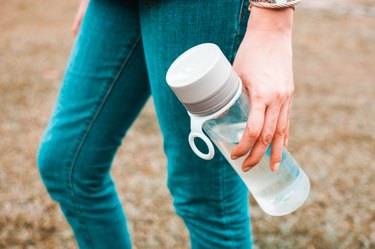
A water diet is a type of water-only fasting that has been around since the 1970s. Though some people tout its benefits, there hasn't been much evidence of its success. In fact, subsisting on only water for extended periods of time may come with health risks.
Benefits of Water
Video of the Day
The human body is made up of 60 percent water. As such, humans need a certain amount of water per day to survive: Women need about 2.2 liters (2.3 quarts) per day, while men need about 3 liters (3.2 quarts), says the U.S. Department of the Interior.
Video of the Day
The Centers for Disease Control and Prevention explains why your body needs water. First, it helps regulate your body temperature, keeping it at a normal level. It also helps lubricate and cushion joints and protect your spinal cord by acting as a shock absorber. Finally, it helps you flush waste through perspiration, urination and bowel movements.
The three-day water diet is a fast during which only water is consumed. According to a review published in the February 2018 issue of the journal BMC Complementary and Alternative Medicine, the researchers found that fasting improved hypertension, rheumatoid arthritis, cardiovascular disease, metabolic syndrome, osteoarthritis and more.
However, there's not much peer-reviewed research that evaluates the safety of water-only fasting. While consuming water accompanied by food on a daily basis is recommended, consuming water alone over three or more days can be dangerous.
Read more: The Benefits of Electrolytes in Water
Water Fasting Dangers
Before embarking on a water diet or any fasting diet, for that matter, you should know the water fasting dangers. A chart in the BMC Complementary and Alternative Medicine article shows the adverse effects of water-only fasting, some of the most common of which are fatigue, insomnia, nausea, headache and hypertension.
A water diet is a type of intermittent fasting, which Harvard Health Publishing says has its pitfalls. As a weight-loss approach, it's not necessarily the most sound, as abstaining from eating for long periods of time can cause people to binge on unhealthy food as a "reward." There may be an urge to overeat during the nonfasting days.
Harvard Health Publishing also warns against intermittent fasting for those with certain conditions, such as diabetes. Also, those who take medication for heart disease or blood pressure should steer clear of intermittent fasting, as they're more susceptible to electrolyte abnormalities.
Other potential pitfalls, according to the Mayo Clinic, are that fasting and exercising at the same time could cause low blood sugar, which may lead to dizziness and confusion and that skipping breakfast has been associated with obesity.
Healthy Ways to Lose Weight
There are plenty of healthy ways to lose weight that don't involve intermittent fasting or consuming only water over a stretch of days. The best way to shed pounds comes from a combination of healthy eating and exercise, says the U.S. Department of Health and Human Services (DHHS).
You can replace unhealthy food with fruits, vegetables, whole grains, proteins and low-fat dairy products. You can also prepare your foods in a healthier way, such as baking instead of frying. One way to stay on a healthy eating track is to keep a food diary, which will help you see any unhealthy eating habits.
Doing physical activity regularly will also help with your weight-loss goals. Both cardio exercise and strength training will help you burn calories. In fact, according to the DHHS, adding muscle is a good way to burn calories when you're not exercising.
Try to find physical activities that you enjoy or go out of your way to move around more often. That might mean taking the stairs instead of the elevator or parking your car at a more distant location so you have to walk.
- Centers for Disease Control and Prevention: "Water & Nutrition"
- Harvard Health Publishing: "Not So Fast: Pros and Cons of the Newest Diet Trend"
- BMC Complementary and Alternative Medicine: "Is Fasting Safe? "A Chart Review of Adverse Events During Medically Supervised, Water-Only Fasting"
- Mayo Clinic: "Fasting Diet: Can It Improve My Heart Health?"
- U.S. Department of the Interior: "The Water in You: Water and the Human Body"
- U.S. Department of Health and Human Services: "Lose Weight the Healthy Way"
Is this an emergency? If you are experiencing serious medical symptoms, please see the National Library of Medicine’s list of signs you need emergency medical attention or call 911.